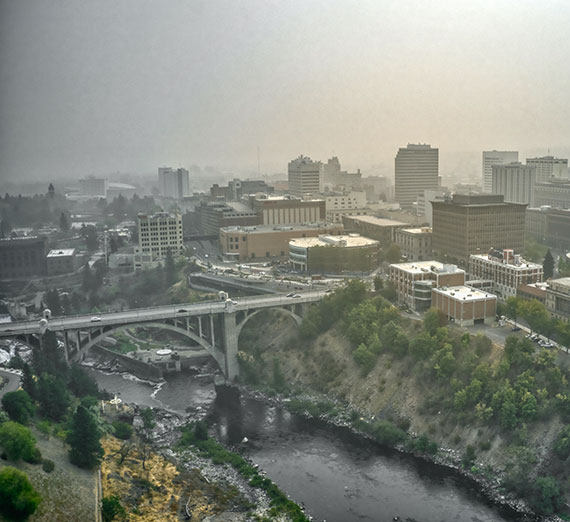New $1.1 Million EPA Grant to Make Spokane “Smoke Ready” Expands Gonzaga’s Climate Leadership

It might start with a slight scent of smoke from a faraway wildfire, and often ends with weeks-long warnings about hazardous air quality, calls to shelter indoors and lessons about how to build homemade air filters. And some years, wildfire season explodes into global tragedy as it did in 2023, across Canada, to the shores of Maui, to right here in Spokane, where two wind-driven August fires near town burned more than 20,000 acres and destroyed a reported 360 primary residences.
For years the Gonzaga Institute for Climate, Water and the Environment — formerly known as the Center for Climate, Society and the Environment — has worked to help the Spokane community navigate the effects of climate change through rigorous academic research and scholarship, strategic regional partnerships and outreach directly into communities affected by things like wildfire smoke and extreme heat.
The project is designed to help reduce indoor exposure to pollutants in wildfire smoke in the City of Spokane and community centers serving disadvantaged populations, including the Martin Luther King, Jr. Family Outreach Center, West Central Community Center and Northeast Community Center. The money will go toward health awareness outreach, air-quality monitoring, HVAC upgrades and a public-engaged process of developing smoke readiness plans for buildings and communities.
“The Gonzaga Climate Institute exists to help our community understand and respond to our rapidly changing climate,” says Director Brian G. Henning.
The two-year, $220,000 subaward the Spokane Clean Air Agency is receiving from the EPA will help the organization build upon the Smoke Ready work the agency has been doing for several years in collaboration with the Spokane Regional Health District, according to Scott Windsor, the agency’s executive director.
“The funding will allow us to expand our work and reach more residents with more information and actionable steps they can take, before and during wildfire smoke events, to protect their health and the health of those in their care,” Windsor says.
In addition to partnering with local governments, agencies and peer higher education institutions, the Climate Institute's Smoke Ready Spokane project is a cross-campus partnership with the departments of mechanical engineering and computer science. Mechanical engineering’s Marc Baumgardner will oversee the installation of air-quality sensors, data analysis and HVAC upgrades, while Aaron Crandall in computer science will oversee development of on-site “dashboards” displaying real-time air quality and temperature data, in addition to working with sensor data gathering and storage.
The Smoke Ready Spokane project and its collaborative, interdisciplinary approach to solving problems in the community through leadership and service to the common good is one reason the Gonzaga Board of Trustees voted to expand the work and mission of the former Climate Center to evolve into a new Institute for Climate, Water and the Environment. The change further cements Gonzaga’s commitment to care for the planet and work in solidarity with the world’s poor and vulnerable as the first American university to commit to Pope Francis’ Laudato Si Action Platform, the Catholic Church’s initiative to combat the climate crisis through bold action to protect our common home from ecological disaster.
“In establishing the Climate Institute, Gonzaga is committing its full institutional weight to help understand and respond to the climate crisis,” says Henning. “Our Jesuit mission requires us to do more to hear the cries of the poor and the cries of the Earth, and we must do it faster.”
The Climate Institute’s formation is one aspect of Gonzaga’s update to its strategic plan, adopted in the summer of 2023. Noting the Jesuit commitment to justice includes caring for humanity’s common home, the school’s Board of Trustees made their own commitment by establishing this academic institute dedicated to understanding and responding to environmental crises to realize a just world.
Read the EPA's announcement of the wildfire-related grants here.
